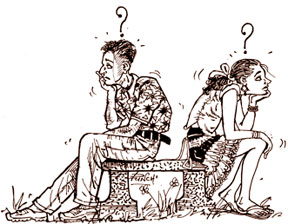Coming to grips with
the 'post honeymoon stage':
by Anushka Nanayakkara and Sajitha Prematunge
In a very practical and specific perspective of how men react to
sentiments, we realized that it's high time women became aware of what
goes on in a man's mind rather than struggling to discover where and
what went wrong.
 Many women of our society become frustrated and annoyed believing
that men behave completely differently when responding to sentiments.
Generally men and women think, feel, perceive, react, respond, love,
yearn, and appreciate differently. Many women of our society become frustrated and annoyed believing
that men behave completely differently when responding to sentiments.
Generally men and women think, feel, perceive, react, respond, love,
yearn, and appreciate differently.
Frankly one might even say that's how they've been created. What's
required is to analyze the psychological differences and learn to deal
with the dissimilarities, practically. Only then will it be possible to
deal, correct or resolve the differences arising in terms of sentiments
of a man towards a woman.
Various grades of people of both sexes, in society will give their
testimonials as to how they react to sentiment or lack of it there of;
which will in turn put to right the incorrect depictions surrounding
men, their understanding of the opposite sex, their clear application of
sentiments without restraint, etc... The vision is to envision a
man-made-world as not totally devoid of sentiment rather than building
on their stereotypically masculine attributes.
Military Spokesman Brigadier Prasad Samarasinghe said that a majority
of men are, in fact very sensitive. But men inherently have the immunity
of succumbing to it.
Especially those in the forces receive the training necessary to
control themselves from being hyper sentimental. "With time and maturing
one would learn to be stronger or to hold on without showing a bleeding
heart to the world".
He also said it's arbitrary and depends on individuality and how
organised and capable one could be. The Brigadier said that this does
not mean men who do not cry in public are abnormal. In general men and
women are equally sensitive but the methods of expression or capacity
for tolerance would definitely differ according to individuality.
Well known dramatist, actor and University lecturer of Theatre and
image arts, Priyankara Ratnayaka told the Sunday Observer that he does
not agree with the norm that man is less sentimental and emotional than
women. "They just express emotions in a different ways".
For example in an extremely sad situation women may cry and men may
not. "But this does not mean that they are not emotional, just because
you don't see them cry" Explained Priyankara Ratnayaka. He further
commented that lack of emotional expression could even lead to physical
illnesses. "Then there are women who express less emotions than even
men".
Women are generally considered to be impulsive, but men aren't. Men
may cry on the sly, because they consider crying as a sign of weakness
which may be damaging to their personality. He also claimed that the
opportunities men have to express their emotions are more vast than
women.
Men go out with their friends, socialize, drink and let out steam.
"More over Asians are generally bound by cultural restraints" Asians
specially Sri Lankans prefer not to express their emotions much.
Consequently men and women are trained to take up different roles from a
very young age.
"Although we have learned to move with the rest of the world in
studies like arts, drama, etc.... genes get in the way of our men and
women stepping out of their stereotypical roles". Women are generally
considered to be stereotypically soft hearted and men hard hearted.
As a dramatist, Priyankara Ratnayaka explained that actresses are
considered better at doing a good job with expressing the emotions of
their characters than actors. "That's what makes actors like Marlon
Brando great actors. Men are less flexible at expressing emotions, but
not necessarily less emotional".
Mallika Karunaratna, Secretary to the Ministry of National Heritage,
claimed that the office is not a place where you brought emotions to.
She agreed that up to a certain extent, and concerning different careers
the stereotypical roles may make some sense, but in the government
sector both sexes have to be restrained in expressing their emotions.
"Buddhist philosophy has a prominent place in my life, and I am a
true follower of equanimity or the middle path. You have to be mindful
not to go in to extremes even with expressions of emotions".
Renowned Author and physician Dr. Priyanga De Zoysa said that
'sentiment' is just a tag people use for describing different emotional
states. But never the less stereotypes exist.
The reason for most disputes between couples may be that women tend
to generalize and men tend to misinterpret. "A woman might say 'Our
lives are so hectic'.
She may not mean this in the true sense of the word and if the man
takes this in its' literal sense, he's in for trouble. The meaning of
your communication is the response you get" In this sense it's clear
that both sexes use the same language to convey different sentiments.
Men are direct and they cannot comprehend the indirectness of women.
It's a myth that men are less sentimental, it's just that they sometimes
prefer not to express it. They will only talk when they prefer it and be
sentimental only when they chose to.
At the 'honeymoon stage' or initial stage of a relationship both
parties tend to overlook the fact that they are two different people.
But both parties later realize that it's just a transient phase, at this
state - the 'post-honeymoon stage' both men and women have to be
compromising.
[email protected]
|
